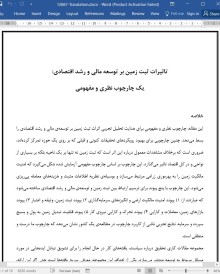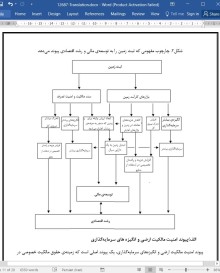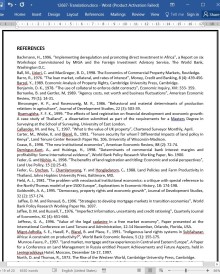
دانلود مقاله تاثیرات ثبت زمین بر توسعه مالی و رشد اقتصادی
خلاصه
این مقاله، چارچوب نظری و مفهومی برای هدایت تحلیل تجربی اثرات ثبت زمین بر توسعهی مالی و رشد اقتصادی را بسط میدهد. چنین چارچوبی برای بهبود رویکردهای تحقیقات کنونی و قبلی که بر روی یک حوزه تمرکز کردهاند، ضروری است که برخلاف مشاهدات معمول درباره این اثر است که ثبت زمین نه تنها بر یک ناحیه بلکه بر بسیاری از نواحی و در کل اقتصاد تاثیر میگذارد. این چارچوب بر اساس چارچوب مفهومی آزمایش شده شکل میگیرد که امنیت مالکیت زمین را به بهرهوری زراعی مرتبط میسازد و بوسیلهی نظریه اطلاعات مثبت و هزینههای معامله پی-ریزی میشود. این چارچوب با پنج پیوند برای ترسیم ارتباط بین ثبت زمین و توسعهی مالی و رشد اقتصادی ساخته میشود که عبارتند از: 1) پیوند امنیت مالکیت ارضی و انگیزه های سرمایهگذاری 2) پیوند ثبت زمین، وثیقه و اعتبار 3) پیوند بازارهای زمین، معاملات و کارایی 4) پیوند تحرک و کارایی نیروی کار 5) پیوند قابلیت تبدیل زمین به پول و بسیج سپرده و سرمایه. نتایج تجربی ناشی از کاربرد چارچوب در مطالعهی یک کشور نشان میدهد که چارچوب ما درست و منطقی است.
مجموعه مقالات کاری تحقیق درباره سیاست، یافتههای کار در حال انجام را برای تشویق تبادل ایدههایی در مورد مسائل مربوط به توسعه منتشر میسازد. یکی از اهداف این مجموعه، معرفی سریع یافتهها است حتی اگر این ارائه، کمتر از یک یافتهی تمام و کمال باشد. این مجموعهها حامل اسامی نویسندگان است و باید بر این اساس استناد شود. یافتهها، تفاسیر و نتایجی که در این مجموعهها ارائه میشوند همگی متعلق به نویسندگان هستند و لزوماً دیدگاه بانک جهانی، مدیران اجرایی آن یا کشورهایی که نماینده آن هستند را نشان نمیدهند. مقالات کاری تحقیق درباره سیاست بطور آنلاین در سایت http://econ.worldbank.org. در دسترس هستند.
1.مقدمه
نقش ایفا شده توسط حقوق مالکیت خصوصی در توسعهی اقتصادی دنیای غرب قویاً توسط مورخان اقتصادی مثل نورث و توماس (1973) و روزنبرگ و بردزل (1986) ثبت شده است که بخصوص بر توانایی افراد و سازمانها بر اظهار دعاوی قابل اجرا برای دارایی و جوش دادن معامله تاکید میکنند. بعلاوه، مطالعات تجربی رابطهی میان حقوق مالکیت خصوصی و رشد اقتصادی را برآورد کرده است، خصوصاً مطالعهی تورستنسون (1994) و گلداسمیت (1995) که مثبتی بین حقوق دارایی ایمن و رشد اقتصادی را نشان می دهد. این دو مطالعه که دقیقترین مطالعات از لحاظ تجربی در میان تمام مطالعات هستند، بر اساس آنالیز رگرسیون مقطعی در کل کشور انجام شدند. حقوق مالکیت از طریق شاخص ها سنجیده شدند.
مطالعهی تورستنسون از میزان مالکیت املاک توسط دولت به عنوان شاخق حقوق دارایی استفاده می کند و اینکه آیا کشورها تصرف مالکیت خصوصی را انجام می دهند یا خیر، در حالی که مطالعه گلداسمیت از شاخص دوم بعلاوهی میزانی که هر دولت ملی از اموال خصوصی محافظت می کند، استفاده کرده است. در حالیکه این دو مطالعه یک مشارکت بسیار سودمند برای آنالیز تجربی تاثیرات اقتصادی حقوق مالکیت را بوجود آوردهاند، عدم توانایی آنها در استفاده مستقیم از معیارهای حقوق مالکیت، یک ضعف قابل توجه به شمار میرود.
6. نتیجه گیری
مدتهاست که مورخان اقتصادی به نقشی که حقوق مالکیت خصوصی در توسعهی دنیای غرب دارد، استناد میکنند. اقتصاددانان سیاسی بطور تجربی رابطهی مثبتی بین حقوق مالکیت خصوصی و رشد اقتصادی ایجاد کردهاند اما این کار را با استفاده از شاخص هایی بعنوان معیارهای حقوق مالکیت انجام دادهاند و اقتصاددانان کشاورزی و متخصصان املاک و مستغلات شهری نیز بطور تجربی ارتباط بین امنیت مالکیت زمین و بهرهوری زمین را در بخشهای مورد علاقهی خود تعیین کردهاند. باید به این موضوع توجه شود که استفاده از شاخص توسط دانشمندان سیاسی برای اندازهگیری حقوق مالکیت، منبع ضعف در تحقیقات آنهاست. بطور مشابه، تا کنون مطالعات اقتصادهای کشاورزی و متخصصان املاک و مستغلات ضعف خاصی داشتهاند زیرا تاثیرات ثبت زمین که در بخشها جمع شدهاند و آنهایی که بطور کل بر اقتصاد تاثیر میگذارند را به حساب نمیآورند. این مقاله سعی بر آن داشت تا با گسترش یک چارچوب مفهومی و نظری برای هدایت آنالیز تجربی تاثیر ثبت زمین بر اقتصاد، این ضعفها را مورد توجه قرار دهد. بعلاوه، با استفاده از معیاری مستقیم از حقوق مالکیت خصوصی (ثبت زمین )، مطالعهی ما به غلبه بر ضعف مطالعات قبلی حقوق مالکیت که از شاخصها برای اندازهگیری حقوق مالکیت خصوصی استفاده میکنند، کمک میکند.
نتایج تجربی برگرفته از برنامهی چارچوب ما در ثبت زمین در سطح اقتصاد نشان میدهد که این چارچوب درست است.
Abstract
This paper develops a theoretical and conceptual framework to guide the empirical analysis of the effects of land registration on financial development and economic growth. Such a framework is necessary to improve upon current and past investigation approaches which have focused on one sector, contrary to common observations to the effect that land registration affects not just one sector but many sectors and the economy as a whole. It builds upon the well-tested conceptual framework that links landownership security to farm productivity, and is underpinned by the theory of positive information and transaction costs. It is constructed with five linkages, to map the relationship between land registration and financial development and economic growth, namely: (i) the land tenure security and investment incentives linkage; (ii) the land title, collateral and credit linkage; (iii) the land markets, transactions and efficiency linkage; (iv) the labor mobility and efficiency linkage; and (v) the land liquidity, deposit mobilization and investment linkage. Empirical results from the application of the framework to a single country case study indicate that our framework is sound.
The Policy Research Working Paper Series disseminates the findings of work in progress to encourage the exchange of ideas about development issues. An objective of the series is to get the findings out quickly, even if the presentations are less than fully polished. The papers carry the names of the authors and should be cited accordingly. The findings, interpretations, and conclusions expressed in this paper are entirely those of the authors. They do not necessarily represent the view of the World Bank, its Executive Directors, or the countries they represent. Policy Research Working Papers are available.
I. Introduction
The role played by private property rights in the economic development of the Western world has been powerfully documented by economic historians such as North and Thomas (1973) and Rosenberg and Birdzell (1986), emphasising particularly the ability of individuals and organizations to make enforceable claims to property and make contracts stick. Furthermore, empirical studies have estimated the relationship between private property rights and economic growth, notably the studies by Torstensson (1994) and Goldsmith (1995) which found a significantly positive association between secure property rights and economic growth. These two studies, which are the most empirically rigorous of them all, were based on cross- country, cross-sectional regression analysis. Property rights were measured through proxies. Torstensson’s study used, as indicators of property rights, the degree to which property is stateowned, and whether countries undertake seizure of private property while Goldsmith’s study used the latter indicator plus the degree to which each national government protects private property. While these studies have made a very useful contribution to the empirical analysis of the economic effects of property rights, their inability to use direct measures of property rights has stood out as a considerable weakness.
An area in which direct measures of property rights have been used is the study of the economic effects of property rights in land in which the formalization of ownership of land rights, through land titling and registration, has been related to improved access to institutional credit, higher investments in land, higher land productivity, higher land values and higher output and incomes. The most empirically rigorous and influential of these studies is by Feder et al. (1988) which established a positive link between land registration and improved access to credit in rural Thailand. With improved access to credit, Thai farmers with titled land were found to invest more in land and to generate higher output than the farmers with untitled land. Some related empirical studies reviewed by Feder and Nishio (1998) found that land registration led to: higher land values in Thailand, Philippines, Indonesia, Honduras, Brazil and Peru; higher investments in land in Costa Rica, Brazil, Honduras, Jamaica and Ghana; and higher output and income in Costa Rica, Brazil, Ecuador and Paraguay. However, empirical studies done in some rural areas of Kenya, Ghana, Rwanda and Somalia on the economic effects of land registration have found no statistically significant links between land registration on the one hand and investment and land productivity on the other (Mighot-Adholla et al., 1991; Carter et al., 1991; Roth et al., 1994; and Place and Mighot-Adholla, 1998).
VI. Conclusions
Economic historians have long documented the role private property rights played in the development of the Western world. Political economists have empirically established the positive relationship between private property rights and economic growth but have done so using proxies as measures of property rights. And agricultural economists and urban real estate specialists have also empirically determined the link between landownership security and land productivity in the sectors of their interest. It should be noted that the use of proxies by political scientists to measure property rights was a source of weakness in their investigations. Similarly, the studies of the agricultural economists and real estate specialists had some particular weakness in so far as they did not account for the land registration impacts that accrue across sectors and those that affect the economy as a whole. This paper has attempted to address this weakness by developing a theoretical and conceptual framework to guide the empirical analysis of the effects of land registration on the economy as a whole. Furthermore, by using a direct measure of private property rights (land registration), our study aims to overcome the weakness of the earlier property rights studies which used proxies to measure private property rights. Empirical results from the application of our economy-wide land registration framework indicate that it is sound.
خلاصه
1.مقدمه
2. اطلاعات ناقص و هزینه¬های معامله بعنوان پشتیبان نظری برای ثبت زمین، توسعه مالی و رشد اقتصادی
3.چارچوب مفهومی امنیت مالکیت زمین و بهرهوری مزرعه
4. یک چارچوب مفهومی ثبت زمین، توسعهی مالی و رشد اقتصادی
5.ارتباط چارچوب نظری و مفهومی برای ثبت زمین، توسعهی مالی و رشد اقتصادی
6. نتیجه گیری
منابع
Abstract
1. Introduction1
.2 Imperfect Information and Transaction Costs as Theoretical Underpinnings for Land Registration, Financial Development and Economic Growth
3. A Conceptual Framework of Land Ownership Security and Farm Productivity
4. A Conceptual Framework of Land Registration, Financial Development and Economic Growth
5. Relevance of the Theoretical and Conceptual Framework for Land Registration, Financial Development and Economic Growth
6. Conclusions
REFERENCES
- اصل مقاله انگلیسی با فرمت ورد (word) با قابلیت ویرایش
- ترجمه فارسی مقاله با فرمت ورد (word) با قابلیت ویرایش، بدون آرم سایت ای ترجمه
- ترجمه فارسی مقاله با فرمت pdf، بدون آرم سایت ای ترجمه



